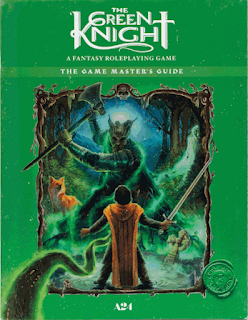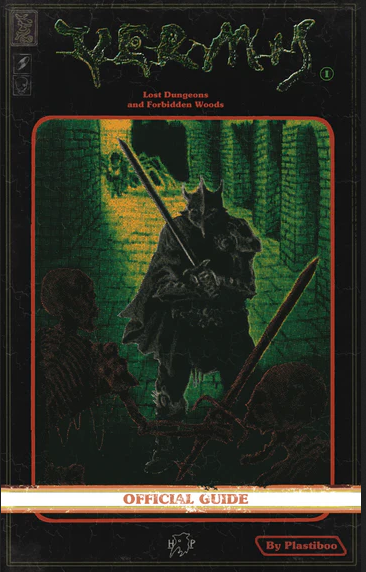Green Knight RPG Review
The 2021 film The Green Knight is, in my opinion, OSR as hell. It’s a quest by an amoral/morally complex knave to confront a strange and unique foe. There is a lot of wilderness travel and encounters of all types, social, magical, and physical. It’s also not focused overly on a cohesive or “satisfying” narrative but rather the wonder and terror of the journey itself. This film has an RPG tie-in.
The system is minimal, with only d20 rolls required and a central mechanic of Dishonor. When a scene begins, characters roll initiative and the highest roll is the Encounter Leader. Not only do they act first, but they adjudicate the end of the scene. On each turn a character marks Dishonor, which begins at 10 and creeps toward 20, at which point the character’s journey is over. Actions are designated as either Honorable or Dishonorable, with an Honorable roll requiring a result equal to or higher than Dishonor, and Dishonorable actions requiring the opposite. Failure in an Honorable act, or success in a Dishonorable one both increase Dishonor by one. It will naturally become both easier and more perilous to act Dishonorably. Honor, on the other hand, can be restored by achieving secret conditions in each scene, or increased by fellow PCs collectively contributing 3 Dishonor to lower a character’s Dishonor by 1. Rolls are modified by a stat and a skill if they are relevant, granting a shift of up to ±4 (depending on whether it’s roll-over or roll-under at the time).
The rewards of resolving scenes may be wealth, status, magic, or a change in Dishonor. This constant ticking clock is in service of the ultimate focus of confronting the Green Knight. Similar to the film, each character has committed the same act as Gawain, beheading the Green Knight for some reason (left up to the player for background purposes) and they must comply with the bargain and meet him one year hence in his Green Chapel. This is, of course, in roleplaying terms, a hard-coded railroad for the players. Thus, it will not be for everyone. It is also not so much a tactical or exploration-focused game so much as a problem-solving one. Quickly resolving dilemmas in the most Honorable manner, which is not easy, is the objective. The method of doing so is also rather abstract, as there are no Hit Points, Armor, social Reactions, Morale, or similarly familiar characteristics to clearly define combat and interaction. The d20+stat+skill modifiers would seem akin to modern Dungeons & Dragons proficiency skill challenges, but ultimately the outcome will be very narrative rather than mechanical- it doesn’t have anything to modify. This is not bad- far from it!- but it is going to necessitate a very Story Game-y progression. I’ll include a sample of the session I ran to illustrate:
Scene: The party investigates the disappearance of townsfolk at a lead mine, where underground fires rage and belch rains of ash each night.
Shane the Hunter: I explore a nearby hill for a vantage point where I can see what is going on as night falls.
Game Master: You know that passing time here will cause Dishonor for the party as you delay on your journey, right?
The party agreed, in order to pursue Honor of a different kind by helping the Common Folk.
Game Master: Make a roll using Vigilance to succeed at an Honorable action. You can’t use Cunning, based on the circumstances, but your Eagle Eye trait will benefit you. You have a +4 bonus.
*Roll is a success*
Game Master: What happens in the time you pass while waiting?
Shane: I find a boar mother suckling her young, helpless in the woods. I watch them, seeing the fragility and power of life, and I will protect the land by cleansing the blight of the fire.
Game Master: Remove a Dishonor, and that will carry forward in your character’s final outcome when we conclude the legend.
Running the system this way was a real challenge, as applying such minimal resolution mechanics to situations required a lot of creative thinking to how it would move the story forward and apply consequences that reflected moral conflict and the struggle for Honor. Ultimately, we achieved different conclusions for each character, with some perishing but living in legend, some living but fading or facing disgrace, and others becoming figures of mythic folklore while still alive. The system, as written, is very restrictive in how the Game Master can present it. There must be a ticking clock, a bargain, and secret conditions for gaining or losing Honor or there will be no tension to the core mechanics.
The included adventure, Quest For Honor, is not very good in my opinion. I didn’t use it. The reason is that it is very, very close to the plot of the film itself. Despite being advertised as not containing spoilers (its release preceded the film), the scenes included, while not identical, are so similar that it will almost spoil the film for those who haven’t seen it, and those who have will be underwhelmed. This is unfortunate, because the way the challenges are presented for the Game Master gives lots of opportunity to engage with the mechanics, both for strict “use this skill” type of roleplaying or “players suggest actions and methods of resolution” which are then interpreted by the Game Master. Thus, I chose to create my own adventure and encounters, which was a lot of work. My adventure was less linear, offering multiple branching paths, but funneling back towards the encounter with the antagonist to comply with the game’s conceit. I didn’t even use the Green Knight, because while it is the focus of the film, it is only one quest within what is a rather deep world (implied, not provided by the game, which is utterly minimal with lore). I used, instead, the Dragon of Saint George, who had bargained with each PC to give them a jewel to pay off debt in their time of need, but that needed to be repaid along with any other terms the Dragon decided. It was a good stand-in, and fulfilled all of the folkloric requirements as well as the obligation of fulfillment similar to the Green Knight’s legend. I also based my point-crawl locations on legend, which were very chronologically disparate, but which fit the theme of conflict between Christian and Celtic/Welsh/Briton legend. It was quite a lot of work. But it was fun.
So what is the deal with this game, ultimately?
I love it. The Green Knight is one of my favorite films, and I think that this game mechanically and atmospherically captures what makes it great. I think that it has great characters, very simple to create and play, and that Dishonor is an excellent mechanic even if difficult to apply to all situations. I think that the narrow, rather railroad-y focus of the game is accurate to a grand literary quest. It is not, at all, OSR. It’s something strangely both narrative, yet consequential. It balances power between players and Game Master. It is not about life or death, but theme and conclusion, legacy and legend. It is odd, and not for everyone, but it is for me.









Comments
Post a Comment